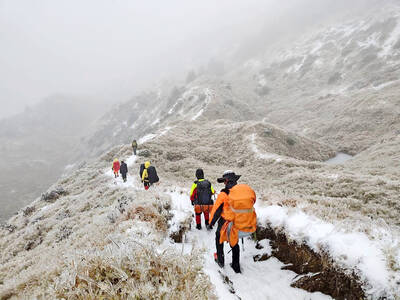Activists monitoring cross-strait relations and media experts yesterday urged the National Communications Commission (NCC) to reject the application for a merger between cable service operator China Network Systems (CNS) and Ting Hsin Group, saying that the deal could cost Taiwanese media outlets their independence.
Ting Hsin Group’s Wei Chuan Foods Corp was recently found by the Food and Drug Administration to have sold processed food made with recycled waste oil.
The NCC said on Wednesday that it has yet to receive applications from both parties.
Lai Chung-chiang (賴中強), convener of the Cross-Strait Agreement Watch, said incidents of media outlet self-censorship have risen in Hong Kong amid media ownership by corporations with major investments in China.
He said that Hong Kong Ming Pao Enterprises chairman Tiong Hiew-king (張曉卿) has invested about HK$2 billion (US$258 million) in China’s petrochemical industry and highway construction.
“Under his management, the [Hong Kong Ming Pao] newspaper’s managing editor Kevin Lau (劉進圖) was transferred to a new job — a move that many saw as a deviation from the paper’s nearly 60-year tradition of being an independent newspaper,” Lai said. “One of the board members even recast the headline of a top news story from ‘Supporters of universal suffrage highest in the past 10 years’ to ‘Hundreds of people rehearse occupation of Central, taken away by the police’ without informing the news department.”
Lai also referred to the Hong Kong Economic Journal, after it was bought by Richard Li (李澤楷).
He said Li’s father, millionaire Li Ka-shing (李嘉誠), has been investing in China since after the Tiananmen Square protests in 1989.
After Richard Li took over the Journal, he asked it “to strike a balance between editorial writers’ ‘emotional index’ and the newspaper’s ‘safety index,’” Lai said.
Taiwan Association of University Professors president Lu Chung-chin (呂忠津) said that the commission let Taiwan’s Want Want Group, which operates more than 100 food and beverage plants in China, buy China Times Group (中時集團) without thorough deliberation over the transaction.
“The Ting Hsin-China Network Systems deal is essentially the same as the Want Want-China Network Systems deal,” Lu said. “Ting Hsin has a massive stake in China, and the commission cannot look at this case as a small matter.”
Citizen Media Watch spokesperson Yeh Ta-hua (葉大華) said that Ting Hsin realized from the adulterated oil incident last year that media outlets could be used to protect the group from harm, which was why they wanted to buy China Network Systems.
“NCC must not let media outlets become Ting Hsin Group’s lucky charm. Otherwise, other corporations will try to follow suit, turning media acquisitions into a Hunger Games for corporate owners. Consumers would lose in that game, though,” Yeh said.

Trips for more than 100,000 international and domestic air travelers could be disrupted as China launches a military exercise around Taiwan today, Taiwan’s Civil Aviation Administration (CAA) said yesterday. The exercise could affect nearly 900 flights scheduled to enter the Taipei Flight Information Region (FIR) during the exercise window, it added. A notice issued by the Chinese Civil Aviation Administration showed there would be seven temporary zones around the Taiwan Strait which would be used for live-fire exercises, lasting from 8am to 6pm today. All aircraft are prohibited from entering during exercise, it says. Taipei FIR has 14 international air routes and

The Ministry of National Defense (MND) today released images of the military tracking China’s People's Liberation Army (PLA) movements during the latest round of Chinese drills around Taiwan. The PLA began "Justice Mission 2025" drills today, carrying out live-fire drills, simulated strikes on land and maritime targets, and exercises to blockade the nation's main ports. The exercises are to continue tomorrow, with the PLA announcing sea and air space restrictions for five zones around Taiwan for 10 hours starting from 8:30am. The ministry today released images showing a Chinese J-16 fighter jet tracked by a F-16V Block 20 jet and the

Snow fell on Yushan (Jade Mountain, 玉山) yesterday morning as a continental cold air mass sent temperatures below freezing on Taiwan’s tallest peak, the Central Weather Administration (CWA) said. Snowflakes were seen on Yushan’s north peak from 6:28am to 6:38am, but they did not fully cover the ground and no accumulation was recorded, the CWA said. As of 7:42am, the lowest temperature recorded across Taiwan was minus-5.5°C at Yushan’s Fengkou observatory and minus-4.7°C at the Yushan observatory, CWA data showed. On Hehuanshan (合歡山) in Nantou County, a low of 1.3°C was recorded at 6:39pm, when ice pellets fell at Songsyue Lodge (松雪樓), a

NO SHAME IN RETREAT: Hikers should consider turning back if the weather turns bad or if they do not have sufficient equipment, the Taroko park headquarters said Two people died of hypothermia over the weekend while hiking on Hsuehshan (雪山), prompting park authorities to remind hikers to bring proper equipment and consider their physical condition before setting out in the cold weather. Temperatures dropped over the weekend, bringing snow to high altitudes in Shei-pa National Park. One hiker, surnamed Lin (林), who on Friday was traveling with a group of six along the Hsuehshan west ridge trail, lost consciousness due to hypothermia and died, the Shei-pa National Park Headquarters said. On Saturday, another hiker, surnamed Tien (田), in a group of five on the southeast of the west